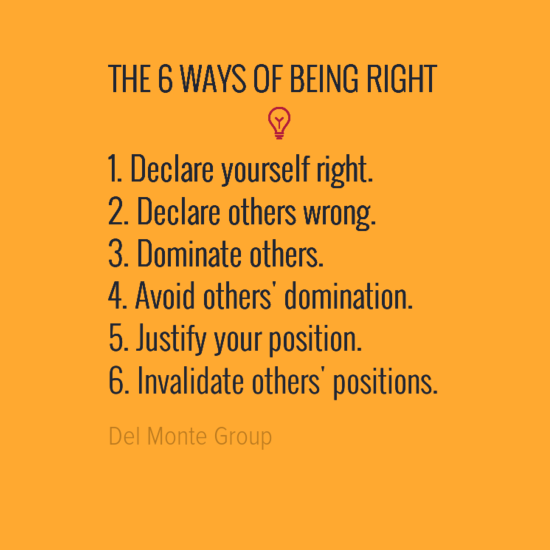
My colleague, Andy Bryce, and I were able to spend two days last week working with a wonderful family who are in the middle of a multi-year transition of the family’s business to their very capable rising generation. Today, as we reflected on the progress the family had made together, Andy and I were musing about how devastating the effects are to the family when individual family members are focused almost exclusively on “being right,” and avoiding being made to feel wrong by other family members.
This obsession with “being right” seems to have reached epidemic proportions in our nation and in the world today. One only has to look at how polarized our national politics have become to see how bad the situation is. From the president’s tweets to the ad hominem attacks coming from political leaders and journalists, the cesspool seems to deepen every day. It is abundantly clear that all this finger pointing has contributed to our growing sense of having lost our way as a national and global family.
“Being right” is no longer synonymous with being correct. The way we see “being right” show up in our work with families is as a form of behavior exhibited by individuals toward others they are in relationships with. To be more accurate, “being right” comes across as behavior that we actually inflict on each other, instead of a simple statement of fact. It’s become an action verb instead of a noun.
In our work, we have identified six ways that we behave toward each other when we believe that we are right.
Six Ways of Being Right
- We declare ourselves right. “There’s no point in discussing it, Betty, because I’m right.”
- We declare others wrong. “You can save your breath, Jim, because you’re dead wrong.”
- We dominate others. This includes behaviors like talking and talking and talking so others cannot get a word in edgewise, yelling, and physically intimidating others into submission.
- We avoid others’ domination. This can include leaving a room during an argument, not returning phone calls, never being in the same place as your family members, and moving away from your family to create physical or emotional distance. We can think it is “better that way,” but, as they say, the silence is deafening and has the effect of shining a spotlight on how badly frayed the relationship really is.
- We justify our position. “Let me recite for you all the reasons why I’m right.”
- We invalidate others’ positions. “That’s the most absurd thing I’ve ever heard.” Or, “I’m going to speak s-l-o-w-l-y because you are clearly too stupid to understand me.” Another favorite, “You aren’t worth the time or effort it takes to talk to you.”
Do you notice how much energy is involved in each of these six ways? These are definitely action-oriented, and meant to push or hold someone else down, so we can be on top, aren’t they?
Rather than resolving a dispute, “being right,” behavior actually creates a second conflict to fight over—who will win and who will lose. Nobody wants to lose, so the fighting becomes even more intense and often ends up in areas far from the original topic. “Oh, yeah? What about when you did THIS five years ago???” Sound familiar?
We engage in “being right” behavior with each other almost constantly throughout the day. Want to find out if you are doing it yourself? Just notice the level of tension you experience when you are talking to someone else. If you feel your tension level rising, you are most definitely “being right,” or avoiding “being wrong.”
How do you avoid this vicious cycle? It’s all about how you listen. Most people are terrible listeners. We might think we listen well, but too often when others are talking, we have little voices in our heads refuting what the speaker is saying, or thinking about what we are going to say next. That’s not real listening.
What we need to do is listen to understand what others are saying to us. Listen as if you will have to repeat what they are saying, verbatim. In fact, go ahead and repeat it back to them in the form of, “What I’m hearing you say is ___. Did I get that right?” That is a level of listening that is very difficult to do because most of us weren’t taught how when we were young, and it is hard to do without a lot of practice. So practice it, already. You will find that listening to understand will open up your relationships like nothing you’ve ever experienced before. Those you interact with will experience every conversation with you as a massive gift. They will feel heard like never before, and as a result of your efforts, your relationships will blossom in ways you can’t even imagine.
Imagine the possibilities!
Alamo, CA neighbors and beyond it’s time to discover your Place of Possibility™ today. Our goal is to address every aspect of your life, defining a clear and actionable plan that meets your lifestyle needs. So, whether we’re holding your hand or taking more of the reins for you while you do life, you can rest assured that your money is growing and working for you while you enjoy it. Who knew?! Sound like something you’re struggling with or need more of? Get in touch to schedule a free 30-minute consultation, and let’s get started! You can contact us in a few different ways. One, by calling at 925.736.6410, you can send us an email at Info@APlaceOfPossibility.com or jump right into our calendar and select a date and time that works for you. We’re excited to meet with you!
